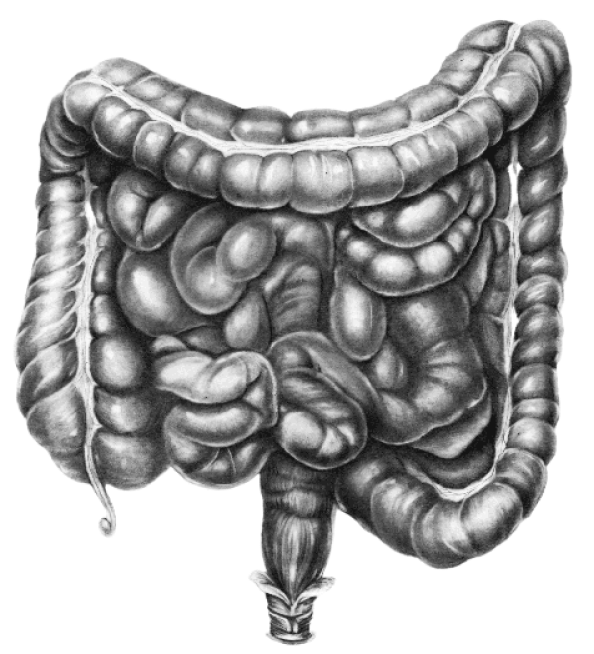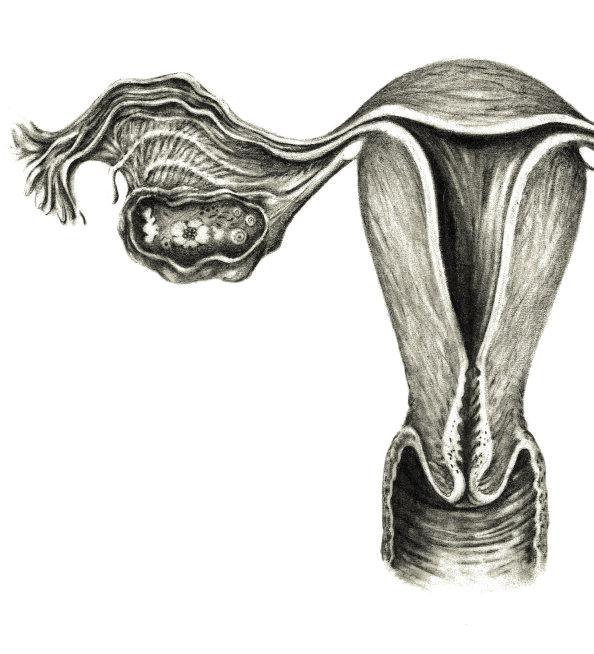
Gut health
The effects of Ginseng and its bioactive constituents on Gut Health: Review of Ginseng's benefits for Inflammatory Balance and Microbiota modulation.
- Introduction
- Inflammatory Balance
- Microbiota modulation
- Conclusion
- Bibliographic references
While Korean ginseng has been traditionally renown for its positive effects on brain function and mental stamina, recent research has unveiled another compelling aspect of this ancient panacea's therapeutic potential: gut health.
More specifically, ginseng and it's bioactive constituents (ginsenosides and polysaccharides) have been found to play a key role in immunomodulatory and microbiota-supporting activities - two functions considered instrumental in maintaining gut health, and overall well-being.
The modulation of inflammation is a critical aspect of gut health. Indeed, the gut is home to the highest proportion of immune cells in the body: the myriad of interactions it has with food, microbes and other environmental factors, make the gut the epicenter of immune balance. For the same reason, this organ is indirectly implicated in a wide range of health issues, especially those related to chronic inflammation.
Phytonutrients from medicinal plants provide a unique means of tackling gut inflammation. Among them, bioactive compounds from Panax ginseng have been identified as particularly interesting for their immunomodulatory activity and their beneficial effect on gut immune balance. And its primary mechanism of action to support immune homeostasis through promoting immunotolerance:
Multiple ginsenosides [1-2] including Rk3 [3], Rh4 [4] and Rd [5], have been shown to support Treg Lymphocytes and therefore improve immunotolerance. The inhibition of NFkB and NRLP3 reported for some of these ginsenosides [6-7] could partially be due to this effect.
This process is a key aspect of immunotolerance at the gut barrier level and it has a significant beneficial impact on chronic inflammation of the digestive tract. In addition, ginseng polysaccharides have also been identified as modulators of the Kynurenin / Tryptophan ratio [8], leading to an additional support of Treg cells and immunotolerance.
It should be noted that inflammation homeostasis at the gut barrier level is critical to ensure gut barrier integrity. Korean red ginseng could therefore represent an opportunity for new therapeutic pathways in the context of chronical colitis or the “leaky gut” syndrome [9-12].
Recent studies have shown that both ginsenosides and ginseng polysaccharides [13-15] support gut health through microbiota modulation, with many studies reporting the particularly beneficial effect of Rg3 [16-17], Rh4 [18], Rc [19], Rg1 [20], or Rb1 [21].
This influence on microbiota balance appears to have health benefits on a wide variety of issues [22-29], including metabolism dysfunction and the gut / brain axis. While the physiological process leading to microbiota homeostasis is yet to be understood, these findings emphasize the promising potential of adding bioactive constituents of Korean red ginseng in microbiotic formulas.
In summary, the nuanced relationship between ginsenosides, ginseng polysaccharides, and gut health is beginning to unfold, potentially offering new perspectives to the development of innovative therapeutic solutions for gut health.
By influencing inflammatory balance through promotion of immunotolerance, and supporting gut health through microbiota modulation, these components have shown promising potential in addressing prevalent gut-related health issues such as chronic colitis and 'leaky gut' syndrome.
While additional research is needed to understand its mechanisms, the role of ginseng's compounds in maintaining the gut's immune homeostasis and microbial harmony further accentuates their potential in the context of gut-brain axis and metabolic dysfunction.
- [1] Kim J, Byeon H, Im K, Min H (2017) – “Effects of ginsenosides on regulatory T cell differentiation.” Food Sci Biotechnol. 2017 Nov 23;27(1):227-232. doi: 10.1007/s10068-017-0255-3. eCollection 2018 Feb.
- [2] Xu YQ, Lv W, Wu HJ, Shi S- (2020) – “Ginsenoside regulates Treg/Th17 cell ratio and inhibits inflammation to treat COPD.” Pharmazie. 2020 Nov 1;75(11):590-594. doi: 10.1691/ph.2020.0696.
- [3] Tian M, Ma P, Zhang Y, Mi Y, Fan D (2020) – “Ginsenoside Rk3 alleviated DSS-induced ulcerative colitis by protecting colon barrier and inhibiting NLRP3 inflammasome pathway.” Int Immunopharmacol. 2020 Aug;85:106645. doi: 10.1016/j.intimp.2020.106645. Epub 2020 Jun 7.
- [4] Bai X , Fu R , Duan Z , Liu Y , Zhu C , Fan D (2021) – “Ginsenoside Rh4 alleviates antibiotic-induced intestinal inflammation by regulating the TLR4-MyD88-MAPK pathway and gut microbiota composition.” Food Funct. 2021 Apr 7;12(7):2874-2885. doi: 10.1039/d1fo00242b. Epub 2021 Mar 19.
- [5] Jin B, Zhang C, Geng Y, Liu M (2020) – “Therapeutic Effect of Ginsenoside Rd on Experimental Autoimmune Encephalomyelitis Model Mice: Regulation of Inflammation and Treg/Th17 Cell Balance.” Mediators Inflamm. 2020 Dec 17;2020:8827527. doi: 10.1155/2020/8827527. eCollection 2020.
- [6] Yi YS (2019) – “Roles of ginsenosides in inflammasome activation.” J Ginseng Res. 2019 Apr;43(2):172-178. doi: 10.1016/j.jgr.2017.11.005. Epub 2017 Dec 9.
- [7] Lee SY, Jeong JJ, Eun SH, Kim DH (2015) – “Anti-inflammatory effects of ginsenoside Rg1 and its metabolites ginsenoside Rh1 and 20(S)-protopanaxatriol in mice with TNBS-induced colitis.” Eur J Pharmacol. 2015 Sep 5;762:333-43. doi: 10.1016/j.ejphar.2015.06.011. Epub 2015 Jun 6.
- [8] Huang J, Liu D, Wang Y, Liu L, Li J, Yuan J, Jiang Z, Jiang Z, Hsiao WW, Liu H, Khan I, Xie Y, Wu J, Xie Y, Zhang Y, Fu Y, Liao J, Wang W, Lai H, Shi A, Cai J, Luo L, Li R, Yao X, Fan X, Wu Q, Liu Z, Yan P, Lu J, Yang M, Wang L, Cao Y, Wei H, Leung EL (2022) – “Ginseng polysaccharides alter the gut microbiota and kynurenine/tryptophan ratio, potentiating the antitumour effect of antiprogrammed cell death 1/programmed cell death ligand 1 (anti-PD-1/PD-L1) immunotherapy.” Gut. 2022 Apr;71(4):734-745. doi: 10.1136/gutjnl-2020-321031. Epub 2021 May 18.
- [9] Yousuf S, Liu H, Yingshu Z, Zahid D, Ghayas H, Li M, Ding Y, Li W (2022) – “Ginsenoside Rg1 modulates intestinal microbiota and supports re-generation of immune cells in dexamethasone-treated mice.” Acta Microbiol Immunol Hung. 2022 Nov 11;69(4):259-269. doi: 10.1556/030.2022.01881. Print 2022 Dec 6.
- [10] Jin J, Zhong Y, Long J, Wu T, Jiang Q, Wang H, Ge W, Zhao H, Liu D (2021) – “Ginsenoside Rg1 relieves experimental colitis by regulating balanced differentiation of Tfh/Treg cells.” Int Immunopharmacol. 2021 Nov;100:108133. doi: 10.1016/j.intimp.2021.108133. Epub 2021 Sep 20.
- [11] Lei Z, Chen L, Hu Q, Yang Y, Tong F, Li K, Lin T, Nie Y, Rong H, Yu S, Song Q, Guo J (2022) – “Ginsenoside Rb1 improves intestinal aging via regulating the expression of sirtuins in the intestinal epithelium and modulating the gut microbiota of mice.” Front Pharmacol. 2022 Sep 27;13:991597. doi: 10.3389/fphar.2022.991597. eCollection 2022.
- [12] Fan J , Liu S , Ai Z , Chen Y , Wang Y , Li Y , Li X , Xiao S , Wang Y (2021) – „Fermented ginseng attenuates lipopolysaccharide-induced inflammatory responses by activating the TLR4/MAPK signaling pathway and remediating gut barrier.” Food Funct. 2021 Jan 21;12(2):852-861. doi: 10.1039/d0fo02404j. Epub 2021 Jan 6.
- [13] Li S, Huo X, Qi Y, Ren D, Li Z, Qu D, Sun Y (2022) – “The Protective Effects of Ginseng Polysaccharides and Their Effective Subfraction against Dextran Sodium Sulfate-Induced Colitis.” Foods. 2022 Mar 21;11(6):890. doi: 10.3390/foods11060890.
- [14] Wang D, Shao S, Zhang Y, Zhao D, Wang M (2021) – “Insight Into Polysaccharides From Panax ginseng C. A. Meyer in Improving Intestinal Inflammation: Modulating Intestinal Microbiota and Autophagy.” Front Immunol. 2021 Jul 20;12:683911. doi: 10.3389/fimmu.2021.683911. eCollection 2021.
- [15] Li S, Qi Y, Chen L, Qu D, Li Z, Gao K, Chen J, Sun Y (2019) – “Effects of Panax ginseng polysaccharides on the gut microbiota in mice with antibiotic-associated diarrhea.” Int J Biol Macromol. 2019 Mar 1;124:931-937. doi: 10.1016/j.ijbiomac.2018.11.271. Epub 2018 Nov 30.
- [16] Liu D, Tian Q, Liu K, Ren F, Liu G, Zhou J, Yuan L, Fang Z, Zou B, Wang S (2023) – « Ginsenoside Rg3 Ameliorates DSS-Induced Colitis by Inhibiting NLRP3 Inflammasome Activation and Regulating Microbial Homeostasis. » J Agric Food Chem. 2023 Feb 8. doi: 10.1021/acs.jafc.2c07766. Online ahead of print. PMID: 36752740
- [17] Duan X, Cai H, Hu T, Lin L, Zeng L, Wang H, Cao L, Li X (2023) – “Ginsenoside Rg3 treats acute radiation proctitis through the TLR4/MyD88/NF-κB pathway and regulation of intestinal flora.” Front Cell Infect Microbiol. 2023 Jan 6;12:1028576. doi: 10.3389/fcimb.2022.1028576. eCollection 2022.
- [18] Shao J, Ma X, Qu L, Ma P, Huang R, Fan D (2023) – “Ginsenoside Rh4 remodels the periphery microenvironment by targeting the brain-gut axis to alleviate depression-like behaviors.” Food Chem. 2023 Mar 15;404(Pt B):134639. doi: 10.1016/j.foodchem.2022.134639. Epub 2022 Oct 18.
- [19] Xie B, Zu X, Wang Z, Xu X, Liu G, Liu R (2022) – “Ginsenoside Rc ameliorated atherosclerosis via regulating gut microbiota and fecal metabolites.” Front Pharmacol. 2022 Sep 15;13:990476. doi: 10.3389/fphar.2022.990476. eCollection 2022.
- [20] Peng M, Wang L, Su H, Zhang L, Yang Y, Sun L, Wu Y, Ran L, Liu S, Yin M, Li S, Chunyu W (2022) – „Ginsenoside Rg1 improved diabetes through regulating the intestinal microbiota in high-fat diet and streptozotocin-induced type 2 diabetes rats.“ J Food Biochem. 2022 Oct;46(10):e14321. doi: 10.1111/jfbc.14321. Epub 2022 Jul 19.
- [21] Zou H, Zhang M, Zhu X, Zhu L, Chen S, Luo M, Xie Q, Chen Y, Zhang K, Bu Q, Wei Y, Ye T, Li Q, Yan X, Zhou Z, Yang C, Li Y, Zhou H, Zhang C, You X, Zheng G, Zhao G (2022) – “Ginsenoside Rb1 Improves Metabolic Disorder in High-Fat Diet-Induced Obese Mice Associated With Modulation of Gut Microbiota.” Front Microbiol. 2022 Apr 19;13:826487. doi: 10.3389/fmicb.2022.826487. eCollection 2022.
- [22] Lv Y, Zhang Y, Feng J, Zhao T, Zhao J, Ge Y, Yang X, Han H, Zhang M, Chen L, Xu M, Guan F (2022) – “(20R)-Panaxadiol as a Natural Active Component with Anti-Obesity Effects on ob/ob Mice via Modulating the Gut Microbiota.” Molecules. 2022 Apr 13;27(8):2502. doi: 10.3390/molecules27082502.
- [23] Yang X, Dong B, An L, Zhang Q, Chen Y, Wang H, Song Z (2021) – “Ginsenoside Rb1 ameliorates Glycemic Disorder in Mice With High Fat Diet-Induced Obesity via Regulating Gut Microbiota and Amino Acid Metabolism.” Front Pharmacol. 2021 Nov 24;12:756491. doi: 10.3389/fphar.2021.756491. eCollection 2021.
- [24] Peng X, Hao M, Zhao Y, Cai Y, Chen X, Chen H, Zhang Y, Dong L, Liu X, Ding C, Liu W, Yang M, Luo Y (2021) – “Red ginseng has stronger anti-aging effects compared to ginseng possibly due to its regulation of oxidative stress and the gut microbiota.” Phytomedicine. 2021 Dec;93:153772. doi: 10.1016/j.phymed.2021.153772. Epub 2021 Sep 23.
- [25] Bai X, Fu R, Duan Z, Wang P, Zhu C, Fan D (2021) – „Ginsenoside Rk3 alleviates gut microbiota dysbiosis and colonic inflammation in antibiotic-treated mice.” Food Res Int. 2021 Aug;146:110465. doi: 10.1016/j.foodres.2021.110465. Epub 2021 May 31.
- [26] Zhou SS, Zhou J, Xu JD, Shen H, Kong M, Yip KM, Han QB, Zhao ZZ, Xu J, Chen HB, Li SL (2021) – “Ginseng ameliorates exercise-induced fatigue potentially by regulating the gut microbiota.” Food Funct. 2021 May 11;12(9):3954-3964. doi: 10.1039/d0fo03384g.
- [27] Liang W, Zhou K, Jian P, Chang Z, Zhang Q, Liu Y, Xiao S, Zhang L (2021) – “Ginsenosides Improve Nonalcoholic Fatty Liver Disease via Integrated Regulation of Gut Microbiota, Inflammation and Energy Homeostasis.” Front Pharmacol. 2021 Feb 12;12:622841. doi: 10.3389/fphar.2021.622841. eCollection 2021.
- [28] Zhou R, He D, Zhang H, Xie J, Zhang S, Tian X, Zeng H, Qin Y, Huang L (2023) – “Ginsenoside Rb1 protects against diabetes-associated metabolic disorders in Kkay mice by reshaping gut microbiota and fecal metabolic profiles.” J Ethnopharmacol. 2023 Mar 1;303:115997. doi: 10.1016/j.jep.2022.115997. Epub 2022 Dec 9.
- [29] Zhang Y, Wang S, Song S, Yang X, Jin G (2020) – “Ginsenoside Rg3 Alleviates Complete Freund's Adjuvant-Induced Rheumatoid Arthritis in Mice by Regulating CD4+CD25+Foxp3+Treg Cells.” J Agric Food Chem. 2020 Apr 29;68(17):4893-4902. doi: 10.1021/acs.jafc.0c01473. Epub 2020 Apr 21.






